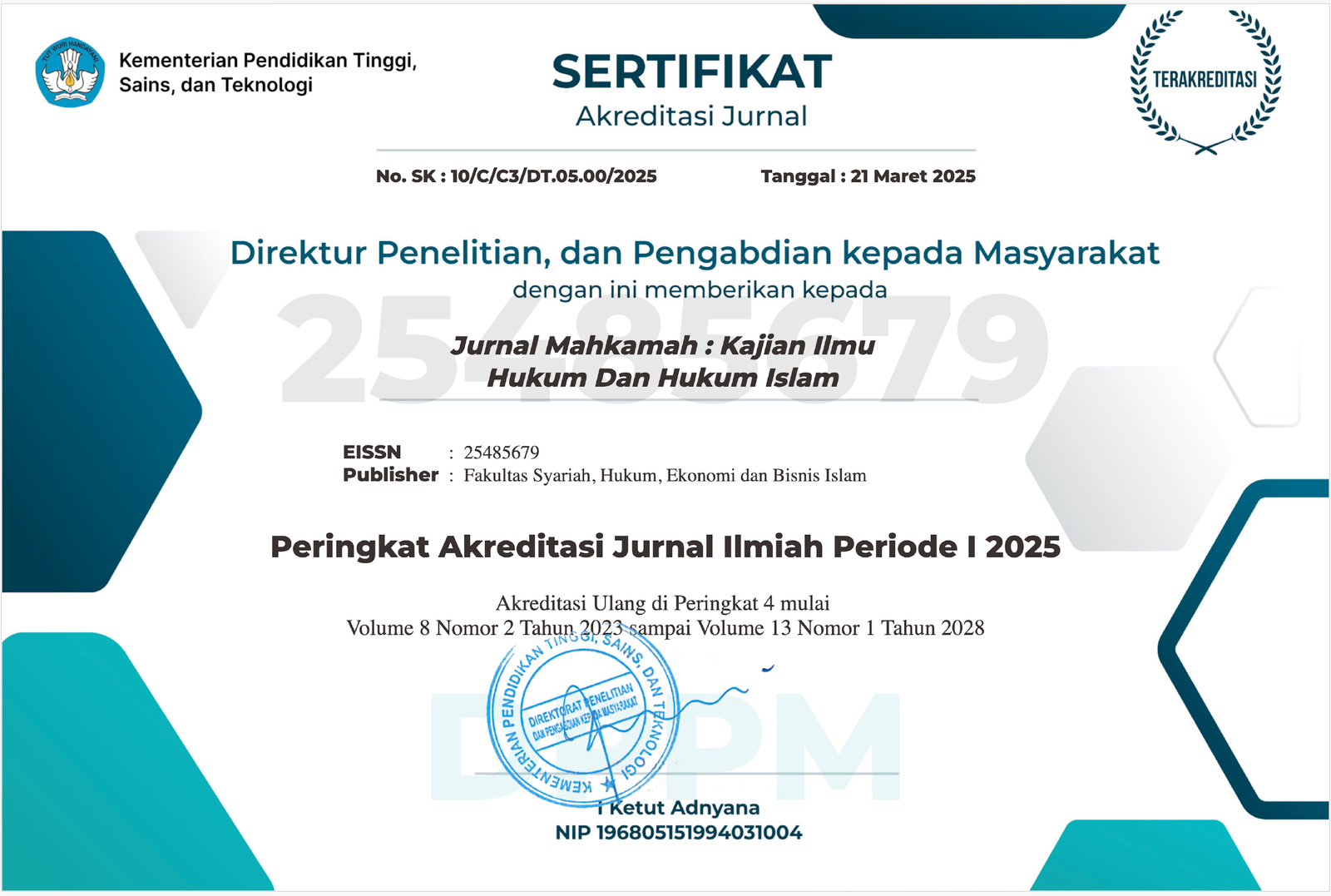Review of Law No 12 Of 2022 Concerning the Criminal Action of Sexual Violence Against the Custom Law of Forced Marriage in Indonesia
(Hifdz Nafs Analysis)
DOI:
https://doi.org/10.25217/jm.v7i2.2800Keywords:
Pemaksaan Perkawinan, Forced Marriage, Hifdz Nafs, Islamic LawAbstract
Marriage is not only about forming a family that occurs because of the union of a man and a woman, but marriage is an inner and outer bond between a man and a woman as husband and wife with the aim to forming a family (household) that happy and eternal based on God Almighty. It becomes a problem if marriage is not based on the desire of each partner because the desire and feelings of mutual love are the main basic in carrying out a marriage. In practice, marriage coming from a coercion is not a new thing, in some areas it has even become customary law. By considering it the Indonesian government passed constitution number 12 of 2022 where forced marriage is categorized as a crime of sexual violence. However, there are still many rejections from several parties because of the conflict between the article and the provision of sharia and customary. By using the juridis-normatif method, this article will review this conflict. Forced marriages which are categorized as criminal acts in Indonesian have been ruled out in some areas by referring to customary provision that put forward the values of Maqashid Sharia. The result is that it is necessary to review Law No. 12 of 2022 that there are positive legal exceptions to customary law that apply in several regions of Indonesia, because the nature of the law itself aims to regulate and measure criminal punishment.
References
REFERENCES
Al-Zuhayli, W. (1997). al-Fiqh al-Islami wa-Adillatuh. Dar al-Fikr.
Al-Khadimi, N. A. M. (2006). Al-Munasabah Al-Syar'iyyah Wa Tatbiquha al-Mu'asiroh. Beirut: Dar Ibn Hazm.
Bakar, A. (2013). KAWIN PAKSA (Sebuah Hegemoni Laki-laki atas Perempuan). AL-IHKAM: Jurnal Hukum & Pranata Sosial, 8(1), 69-85. DOI: https://doi.org/10.19105/al-lhkam.v8i1.341
Bappenas. (2021). Proyek di Penduduk Indonesia 2010-2035.
Bisri, I. (2007). Sistem Hukum Indonesia: Prinsip-Prinsip dan Implementasi Hukum di Indonesia. Raja Grafindo, Jakarta.
Faridl, M. (2006). Merajut Benang Kaluarga Sakinah dalam jurnal Al-Insan No. 3 vol. 2. Jakarta: Lembaga Kajian dan Pengembangan Al-Insan.
Fasa, M. I. (2016). Reformasi Pemahaman Teori Maqasid Syariah (Analisis Pendekatan Sistem Jasser Audah). HUNAFA: Jurnal Studia Islamika, 13(2), 218-246. DOI: https://doi.org/10.24239/jsi.v13i2.438.218-246
Fuady, M. (2013). Teori-Teori Besar (Grand Theory) Dalam Hukum. Jakarta: Kencana.
Husain Al-Munawar, S. A. (2003). Agenda Generasi Intelektual. Jakarta: Pena Madini.
Islam III, E. H. (1999). Jakarta: Ichtiar Baru Van Hoeve, cet.
Jasser Auda (2015). Membumikan hukum Islam melalui maqasid syariah, (penerjemah: Rosidin dan Ali Abd el-Mu‟in) Bandung: Mizan Pustaka,
Kusumaatmaatmadja, M. (2002). Konsep-konsep Hukum dalam Pembangunan, Pusat studi Wawasan Nusantara, Bandung : Penerbit Alumni.
Muhammad, H. (2008). Konsep Dasar Manusia dan Hakikat Pernikahan”. Keluarga Sakinah: Kesetaraan Relasi Suami Istri, ed. by A. D Eridani and A. D Kusumaningtyas, Jakarta: Rahima.
Nurisman, E. (2022). Risalah Tantangan Penegakan Hukum Tindak Pidana Kekerasan Seksual Pasca Lahirnya Undang-Undang Nomor 12 Tahun 2022. Jurnal Pembangunan Hukum Indonesia, 4(2), 170-196. DOI: https://doi.org/10.14710/jphi.v4i2.170-196
Mohsi, M. (2020). Analisis Perkawinan Paksa Sebagai Tindak Pidana Kekerasan Seksual Dalam Rancangan Undang-Undang Penghapusan Kekerasan Seksual PKS. Al-Adalah: Jurnal Hukum dan Politik Islam, 5(1), 1-19. DOI: https://doi.org/10.35673/ajmpi.v5i1.578
Nainggolan, J. F., Ramlan, R., & Harahap, R. R. (2022). Pemaksaan Perkawinan Berkedok Tradisi Budaya: Bagaimana Implementasi CEDAW terhadap Hukum Nasional dalam Melindungi Hak-Hak Perempuan dalam Perkawinan?. Uti Possidetis: Journal of International Law, 3(1), 55-82. DOI: https://doi.org/10.22437/up.v3i1.15452
Roscoe Pound, The Scope and Purpose of Sociological Jurisprudence, Harvard Law Review, Vol.25, No.6 1912. DOI: https://doi.org/10.2307/1324775
Susanto, A. F. (2015). Ilmu Hukum Non Sistematik (Fondasi Filsafat Pengembangan Ilmu Hukum Indonesia). LoGoz Publishing.
Theo Huijbers, O. S. C. (1982). Filsafat Hukum dalam Lintasan Sejarah. Penerbit Yayasan Kanisius, Yogyakarta.
Undang-Undang Republik Indonesia Nomor 12 Tahun 2022 Tentang Tindak Pidana Kekerasan Seksual
Yuningsih, D. (2017). The essence of justice for the living law in the alternative dispute resolution of Indonesia legal system. International Journal of Approximate Reasoning, 5(3), 1930. DOI: https://doi.org/10.21474/IJAR01/3712
Zamboni, M. (2019). Thoughts on Sociological Jurisprudence: Juristic Thought and Social Inquiry.Ratio Juris, Vol.32, No.4 2019. DOI: https://doi.org/10.1111/raju.12261
Downloads
Published
How to Cite
Issue
Section
License
Copyright (c) 2022 Ahmad Zaky Nauval, Muhammad Syukri Albani Nasution

This work is licensed under a Creative Commons Attribution-ShareAlike 4.0 International License.
This work is licensed under a Creative Commons Attribution-ShareAlike 4.0 International License.
Authors retain copyright and grant the Jurnal Mahkamah : Kajian Ilmu Hukum Dan Hukum Islam right of first publication with the work simultaneously licensed under a Creative Commons Attribution License (CC BY-SA 4.0) that allows others to share (copy and redistribute the material in any medium or format) and adapt (remix, transform, and build upon the material) the work for any purpose, even commercially with an acknowledgment of the work's authorship and initial publication in Jurnal Mahkamah : Kajian Ilmu Hukum Dan Hukum Islam.
Authors are able to enter into separate, additional contractual arrangements for the non-exclusive distribution of the journal's published version of the work (e.g., post it to an institutional repository or publish it in a book), with an acknowledgment of its initial publication in Jurnal Mahkamah : Kajian Ilmu Hukum Dan Hukum Islam.
Authors are permitted and encouraged to post their work online (e.g., in institutional repositories or on their website) prior to and during the submission process, as it can lead to productive exchanges, as well as earlier and greater citation of published work (See The Effect of Open Access).









